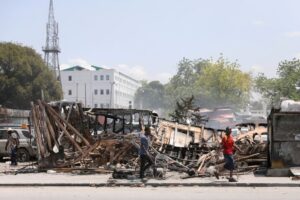All pollsters and political analysts in the mainstream press share a common estimate about the political impact of the deadly “accident” at Tempi, the frontal collision of two trains in the privatized railways in Greece: It was a major event that intercepts political time clearly, splitting it into a “before” and an “after”. Nothing is the same as before.
The crime at Tempi “summarized” the accumulated past bitter experiences of the masses; it charged them more heavily and it oriented them politically. The record losses during the pandemic; the precariousness of labor; the austerity in wages and the high cost of food; the provocatively high profits of industrial and commercial groups; the colossal program of armaments; the surveillance scandal around the National Intelligence Service. All these (and more) were combined and formed a clear picture of the existing reality around us.
This clear understanding is no longer shared only by an important but small political vanguard, but also by a major part of society, and this understanding led to an explosion of anger. Past social and political struggles, that relied mostly on the organized activity of left-wing forces, proved their value today. Mass anger was expressed as a phenomenon that gravitated towards the left of the political spectrum and it utilized the “typical” repertoire of the working-class movement and the Left: Strikes and mass protests that dealt some serious blows to the Mitsotakis government, which was already on the backfoot due to its obvious responsibilities for the crime.
After the fateful night at Tempi, there have been two successfully organized 24-hour general strikes (on the 8th of March and on the 16th of March). These days of strike action also witnessed especially massive rallies in major cities. In medium-sized and small towns, even in the most remote or the most conservative places of the country, the protests were the largest since the mass struggles of 2010-13. On the streets, you could see the expression of the broad presence and activity of the youth, anchored around protest actions in universities and high schools, connecting their anger about Tempi with their rejection of governmental repression and authoritarianism but also the efforts to privatize education.
The protest mood penetrated into spaces where there is a tradition of “no-politics,” like football stadiums. During match days, football fans systematically raise “mega-banners” that denounce privatization and the prevalence of profits over lives, despite the desperate efforts of Football Authorities and club-owners to stop them.
The protests enjoy the support of a broader social majority, including sectors that don’t participate in the mobilizations themselves. This is a foundation for political strength. During the strike rallies on the 16th of March, the government tested the repressive method, deploying special police units that engaged in extensive use of tear gas. Yet instead of fear, the pictures of confrontations on the streets provoked an escalation of anger. Mitsotakis was forced to a disorderly retreat. He fired the police chief, implying he displayed “excessive zeal”.
The emergence of mass mobilizations, during the “delicate” time of a pre-election period, is a rare phenomenon in Greek political history. And it seems like this will continue to be the case: Left-wing unionists are already pressuring for a new 24-hour general strike before the Easter holiday. No matter what happens next in terms of social protests, the political impact they had already made is important.
Inside the right-wing party of New Democracy, the leading group around Mitsotakis is already in a critical condition. Even when a majority of analysts regarded Mitsotakis as a far-reaching, long-term leader for Greek capitalism, we had argued in previous articles that his extreme neoliberal policy had already undermined the electoral/political support for the Right, and it had also undermined the ruling class confidence in him, thus giving rise to the public debate around the prospect of “broad consensus” governments. Mitsotakis has chosen to resist this trend, pursuing the goal of a one-party government, by securing an absolute majority for New Democracy in order to promote a steady continuation of neoliberal counter-reforms. In the heated conditions after Tempi, he brought for parliamentary discussion and vote the decisions to privatize the only public children’s hospital that treats cancer (it is destined as a “gift” to the powerful Vardinogiannis family…) and the public network that manages water resources (something that already provoked new mobilizations, since it is understood as a very crucial counter-reform…). Both Mitsotakis himself and the yuppies around him (interestingly enough, many of them from a social-liberal background…) are oriented to a Thatcherite strategy, meaning that they bet their political future on the full-scale imposition of their political direction at all fronts. But this strict commitment to neoliberal strategy dramatically diminishes the potential for tactical maneuvering from a government that is already on the corner.
Trying to change the agenda after Tempi, the government organized a communication campaign around imminent wage raises. But when the actual governmental decisions were announced, there was a bitter surprise: The minimum monthly wage for white-collar workers remains stuck at 780 euros (before taxes and social security contributions), while the minimum daily wage for blue-collar workers is “raised” from 31,85 to 34,84 Euros (before taxes and social security contributions). This is a mockery that was denounced even from the most conservative sectors of the union bureaucracy. Facing the union demand for wage rises that will compensate for the inflation in prices, the government argues that the establishment of a “wage-price spiral” would be a “nightmare” for the competitiveness of Greek enterprises.
Given this political situation, New Democracy is heading toward a political defeat. After Tempi, all opinion polls show a decline over 5% in its electoral support. Mitsotakis addresses the situation by postponing the election (Towards the end of May? Towards the summer? Towards exhausting all constitutional limits until September?), in the hope that in some weeks or some months his support might rebound. But this tactic is full of its own risks.
On the one hand, there is nothing in the horizon that heralds a potential growth for the Right’s political support. On the contrary, even the mainstream Press is warning that, while the goal of winning an absolute majority is already lost for the right-wing party, the extension of the pre-election period could lead to losing even the first place in the election.
On the other hand, the dismantling of all social civil protection services carries the constant risk for some new “event” like the one at Tempi. The Press is warning that the ships in the Aegean (transporting more than 35 million passengers during summer), the city buses in the streets, the public hospitals that are dried out from personnel, the fire service etc. have long been way beyond the “red line” in terms of safety. Everyone understands that a new testing tragedy like the one at Tempi would bring about an immediate and disorderly collapse of the government…
In this situation, one of the most striking political facts is the stagnation of support for SYRIZA. The decline of New Democracy is shrinking the difference between the two parties, but the stagnation (or even a small decline) of SYRIZA does not produce an alternative governmental solution. Actually, according to the current polling data, even an alliance of SYRIZA with PASOK is not enough to form an alternative governmental solution. The “progressive” camp needs to be joined by a third party (perhaps the party of Yanis Varoufakis?) in order to claim a majority.
Interpreting this stagnation is simple politically. Alexis Tsipras has failed to shake off his responsibilities for the betrayal of 2015. And the course of events serves as a reminder for these responsibilities: the final act in the privatization of Greek railways was signed by SYRIZA in power. Even more important is the fact that Tsipras hesitates to commit his party even to some elementary promises that could persuade some people that a “second chance” in governmental power would be different in terms of promoting some pro-worker measures that would require a break with the status quo. He has stubbornly avoided any commitment to renationalize the railways and declared that a potential government led by him would “renegotiate the terms of the Contract with FDSI”, even while leading members of PASOK talk about “terminating the Contract with the Italians” and kicking FDSI out of any discussion about the future of Greek railways. This serves as infallible evidence for the political trajectory of SYRIZA: Tsipras claims governmental power as the head of a center-left “camp” that has completed its mutation to social-liberalism.
After all, this is the reason that Tsipras is accelerating the promotion of changes inside the party towards its transformation to a force of the political “center”. Crucial posts in the party are occupied by social-democrats who have served the “modernization” project (a Greek version of the Blairite “Third Way”) under former prime minister and ex-leader of PASOK Kostas Simitis. The position of the party’s porte-parole is occupied by Mrs. PopiTsapanidou, a “shiny” journalist who emerged through a career in the morning zone of major private TV channels. It is very probable that SYRIZA’s ballots will include politicians from a current of the right-wing party (the one traditionally close to former leader Kostas Karamanlis), like Manos Antonaros, former spokesperson of a New Democracy government, and others. This party-electoral cartel of the center-left carries the promise of the biggest electoral efficiency but is unable to achieve a clear political victory, thus placing its hopes on Mitsotakis rotting from the inside ever further.
This simultaneous decline of New Democracy and stagnation of the Tsipras-led center-left, describes a political problem for the ruling class. This is the first time after the fall of the dictatorship in 1974 that we are in the middle of the pre-election period and yet local capitalists don’t know what the next government would be. And this is happening on a delicate moment for Greek capitalism. The threat of an international financial deterioration is a reminder that the local atmosphere of “successes” is unstable and unsure. Petros Efthymiou, an experienced social-democrat former minister, drawing a parallel with the train crash at Tempi, stated that “the country is carelessly heading towards a frontal collision at the end of 2023”, pointing to the European decision to end the period of financial “relaxing” and return to the norms of the Stability Pact. Recalling that the Greek debt is close to 190% of GDP, he estimated that even if the Pact is adjusted to a more favorable form, the pressures on any Greek government will remain suffocating when it will be back into force.
It is in this context that we see a sharp rise of the estimates that the outcome of the next elections will be a government of “broad consensus”. Parts of the Press (including the right-wing Press!) have started publishing names of “independent” personalities that could serve as the prime ministerin a “special-purpose government” with the parliamentary support of two, three or more parties. Among them, we find central banker Giannis Stournaras (for years trying to promote himself as a Greek Mario Draghi) or constitutional lawyer Nikos Alivizatos, a distinguished representative of the democratic center, but one who also played a leading role in forming the “anti-left front” in 2010-15, in order to guarantee that Greece will remain a part of the Eurozone. And we are still at the early stages of these debates…
Such a scenario won’t be that easy or simple to conclude. A “solution” of that type involves a crisis in both major parties, the downfall of Mitsotakis from the leadership of New Democracy and a challenge to Tsipras’ dominance in SYRIZA. But mostly, such a “solution” will not produce a stable government that will be able to effectively address the new wave of working-class demands.
After Tempi, the tendency to anti-systemic voting has grown. This can lead to a rise in electoral support for the Communist Party and MERA25 of Yanis Varoufakis. As far as we are concerned, this would be a positive outcome in the “temperature measuring” of our people. It will display a larger potential to oppose from the left and from below any new government, which will start “doing business” right from the point where Mitsotakisleft them.
But the most important thing will be an electoral period marked by the tendency of a growth in struggles and the emergence of a “transitional” platform of working class demands, projected, and established as a basis for united, massive, radical struggles. With the aim to transform the political crisis of Mitsotakis into an actual potential to push back against neoliberal counter-reforms and reverse them.




